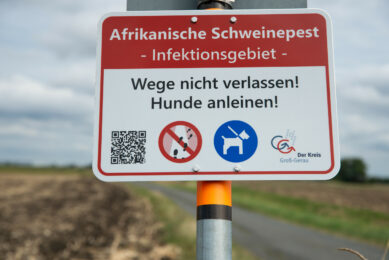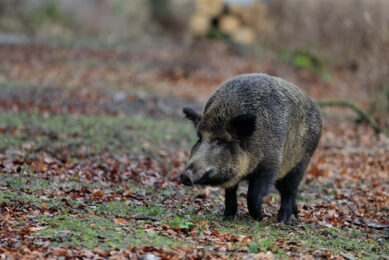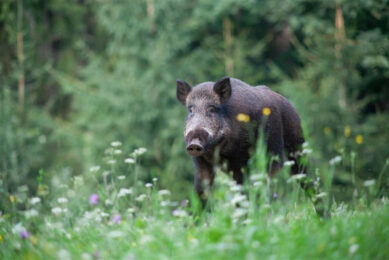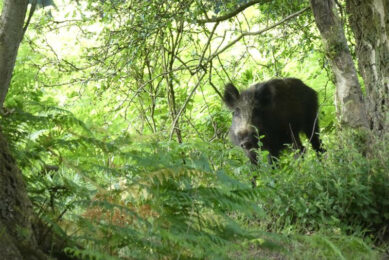ASF Germany: Markets upside down, 13 cases found

African Swine Fever has been around in Germany’s wild boar population for a week now, and as a result, prices for weaner pigs, sows and finisher pigs all received a big blow. The total of infected carcasses has grown to 13 – and more are to be expected.
The market economic situation for swine producers has changed strongly in the last few days in Germany, because of the discovery of African Swine Fever (ASF) in the country’s wild boar population. Trade partners outside the European Union (EU), like China, Japan, the Philippines, South Korea as well as Brazil, Argentina and Mexico have all announced to close their borders for German pork.
Germany’s pig meat exports to China, the major trade partner, alone counted for € 1 billion/year; South Korea was the second largest destination. Inside the EU, there is a policy of regionalisation, which means that trade is business as usual, but because of the dropped demand from so-called third countries, prices have gone down sharply anyway.
Drop in weaner pig prices
Prices for weaner pigs inside Germany have dropped substantially for instance; one of the leading indexes, the German ‘Vereinigungspreis’ for weaner pigs, dropped by € 12 to € 27 after the news broke on ASF.
In an analysis, Pig Progress’ sister title Boerderij wrote that that all is the consequence of uncertainty in the market – finisher pig houses are often still full, and in those occasions there is free space for a fresh load of weaner pigs, most likely local pigs are prioritised rather than those trucked in from surrounding countries. In addition, some finisher pig producers have decided to wait how things will turn out before bringing in new weaners.
In addition to that, earlier this summer the German market suffered a heavy blow by the effects of Covid-19 and the subsequent temporary closure of e.g. the country’s largest slaughterhouse Tönnies in Rheda-Wiedenbrück, North Rhine-Westphalia. The plant has re-opened but is still operating at approximately 75% of its capacity as it is difficult to recruit staff in times of Covid-19. Even before the ASF outbreaks, Tönnies stated to be only fully be back on track in 2021.
Dropping the prices for weaner pigs has therefore become the way to convince finisher pig producers to invest again. Just to put things in perspective – just before Covid-19, the Vereinigungspreis was at € 83/weaner pig.
Weaner price drops are felt in surrounding countries too
That way the crisis has a knock-on effect for countries delivering piglets to Germany, think of Denmark (275,000 weaner pigs/week), the Netherlands or Spain. Danish market expert Markus Fiebelkorn told Boerderij that, in case ASF is a problem that is not going away any time soon, it is very well likely that in the somewhat longer term more weaner pigs will stay in Denmark or will be exported to Eastern Europe.

Read more about pig health in the Pig Progress Health Tool
Also in practice the effect of ASF in Germany is felt. At the border with Serbia, a transport of weaner pigs from the Netherlands was stopped because it had travelled through Germany – and similarly, Italian buyers have second thoughts due to the routes through Germany.
Prices down for sows for slaughter
Not only weaner prices have been suffering from ASF, so are prices for sows for slaughter. Again Tönnies reported that because of impulsive sale of sows, prices dropped to € 0.61/kg slaughter weight, a drop of € 0.10 to previous weeks and even less than half of last year’s level of € 1.31/kg.
The German Vereinigungspreis for sows for slaughter also dropped by € 0.10 to € 0.71/kg slaughter weight. Again, the price drops are also felt in neighbouring countries, like e.g. the Netherlands.
Finishing pigs: prices dropped, then remained the same
In terms of finishing pigs, Germany’s prices dropped last week from € 1.47 to € 1.27 per kg slaughter weight – a striking difference to last year’s price which was at € 1.85. The good news is, however, that the level of € 1.27 was maintained after the € 0.20 drop of last week. According to the German Union for Swine Producers (ISN) that is related to the package of measures that was taken to keep the virus under control.
The stabilisation of the German pig prices has been welcomed in surrounding EU countries, as a further decrease would have led to further pressure on prices in those countries too.

Track the movement of African Swine Fever
For everything you need to know about ASF, from the latest outbreaks to controls stay up to-date…
Number of ASF positive wild boar: 13
In the meantime, new wild boar carcasses continue to be found positive for ASF. While in German media now messages are being shared about dead wild boar in various places, Germany’s reference lab announced on Friday that 6 more carcasses had been found positive; after 1 on Thursday. That brings the total to 13 confirmed cases.
ASF situation in Poland
In neighbouring Poland, in the meantime, the virus has also hopped towards a small farm in Central Poland. Up until now there were two different clusters, one including the entire east of Poland and one smaller cluster, close to (and a little across) the border with Germany. This new farm with 110 pigs was located near Kalisz, 94km away from the easternmost earlier find in western Poland.
In addition, this week a relatively large farm with 1,882 pigs was found positive for ASF closer to the border with Germany. This farm was close to Zbaszyn, Greater Poland province, and located at 82km from the border. Several farms in the neighbourhood were also emptied to be on the safe side.
In total, only in 2020, 90 pig farms in Poland have now been found positive for ASF. With that score, only 2018 had more victims, as then 95 farms were found positive. Of the 90 farms, this year 8 farms had more than 1,000 pigs on-site.











